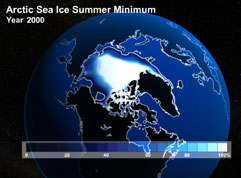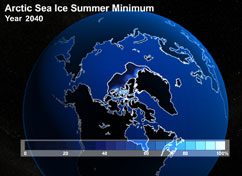Arctic sea ice shrinks to record low in 2007
Arctic sea ice shrinks to record low in 2007
mongabay.com
August 16, 2007
Arctic sea ice has shrunk to a record low according the Japan Aerospace Exploration agency.
Sea ice at the North Pole was 5.31 million square kilometers (2.1 million square miles) on Aug. 15, lower than the previous low of 5.32 million recorded in September 2005. The agency said it expects sea level levels to reach 4.5 million square kilometers, a level the United Nations Intergovernmental Panel on Climate Change projected would occur in 2050, sometime next month. Researchers from the University of Colorado at Boulder say that by their measurements, sea ice levels are not presently at a record low, but they are forecasting a 92 percent chance that the 2007 September minimum extent of sea ice across the Arctic region will fall to an all-time low.

The image from 2000, based on simulations produced by the Community Climate System Model, shows the approximate extent of Arctic sea ice in September. The model indicates the extent of this late-summer ice could begin to retreat abruptly within several decades (top). By about 2040, the Arctic may be nearly devoid of sea ice during the late summer unless greenhouse gas emissions are significantly curtailed (bottom). Courtesy of UCAR. |
According to a statement from the space agency and the Japan Agency for Marine-Earth Science and Technology, a low pressure system over Siberia is warming the Arctic more than usual.
The Arctic is particularly sensitive to changes in the extent of sea ice, which helps reflect sunlight back into space, cooling the region. When sea ice melts, the dark areas of open water absorb the sun’s radiation, trigger a positive feedback loop that worsens melting.
Earlier this year research published in Geophysical Research Letters warned that Arctic sea ice is melting about three times faster than previously believed. The study, conducted by Julienne Stroeve of the National Snow and Ice Data Center (NSIDC) and his colleagues, showed that September sea ice extent retreated at a rate of about 7.8 percent per decade during the 1953-2006 period, not the 2.5 percent projected by simulations. The basis for the data–a combination of satellite measurements and early aircraft and ship reports–is considered more reliable than the earlier records.
This article is based on a report from Bloomberg, a news release from the Japan Aerospace Exploration agency., and previous mongabay.com articles.








